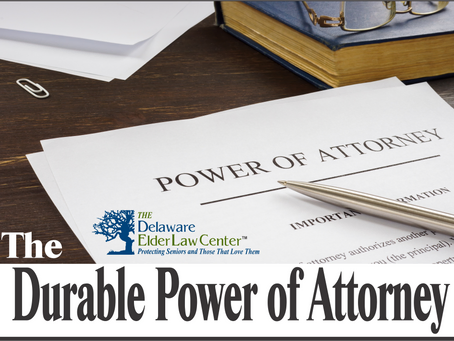Do your aging parents have a Durable Power of Attorney in place naming a trusted individual as agent? If so, is the document properly drawn up and executed according to Delaware law? Does it give the Agent sufficient powers to manage and conduct the financial affairs of the Principal?
The answers to these questions are important. Every adult should have a Power of Attorney in place so that the right trusted person is named their Agent in the event of sudden disability. If they don’t, then someone in the family will have to petition for Guardianship, which is a long and costly process.
The Power of Attorney document must conform to the laws of the state where it is drawn up and executed. If it doesn’t, then the document is invalid and unenforceable. The number one reason a Power of Attorney document is deemed invalid is that either the Principal or Agent did not work with a licensed lawyer. Usually this takes the form of self-help in downloading forms from the internet. Other sources of problem documents include those from accountants, hospital social workers, Notary Public, senior centers, and healthcare facilities.
The lesson here is that it is important to work with a licensed attorney to get the correct documents in place. If your parents lose their ability to make their own decisions after executing an invalid document, then you have to resort to the Guardianship process, which is costly and time consuming.
An Agent is a fiduciary and owes the Principal certain duties of care. The duty of loyalty is the foundation of the relationship. Obtaining a Power of Attorney document from any source other than from an attorney, or agreeing to serve under such a document, is arguably a breach of duty of loyalty right out of the gate. Depending on the facts, a court may hold an Agent personally responsible for the harm caused by breaching the duty of loyalty. Please take the role of Agent seriously and act in the best interest of the Principal.



